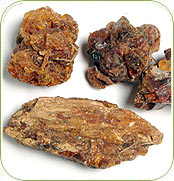Gums
| Infobox on Gums | |
|---|---|
| Example of Gums |  |
| Facts | |
| Origin | - |
| Stowage factor (in m3/t) |
|
| Humidity / moisture | - |
| Ventilation | - |
| Risk factors | See text |
Gums
Description
Gum is a by product obtained as a result of certain metabolic mechanism of plants and trees. The Neem bark, due to some internal activity discharges a clear, bright and brown-coloured gum. The gum is a multipurpose by product. Natural gum obtained from plants are either water soluble or absorb water to form a viscous solution. Neem has been commercially tapped for using its gum which is of use in large number of industries.
Natural gums are polysaccharides of natural origin, capable of causing a large viscosity increase in solution, even at small concentrations. In the food industry they are used as thickening agents, gelling agents, emulsifying agents, and stabilizers. In other industries, they are also used as adhesives, binding agents, crystan inhibitors, clarifying agents, encapsulating agents, flocculating agents, swelling agents, foam stabilizers, etc. Most often these gums are found in the woody elements of plants or in seed coatings.
Natural gums can be classified according to their origin. They can also be classified as uncharged or ionic polymers (polyelectrolytes). Examples include (E number food additive code):
Shipment / Storage / Risk factors
Natural gums are usually shipped in bags, sacks, baskets or cases. Some gums are liable to damage by heat, in which case the damaged portion should be separated as promptly as possible from that remaining sound.
Foreign matter, dirt, dust, etc., is liable to adhere to gums unless properly protected. Gums are subject to loss in weight due to chafing and seepage, which may be aggravated by poor packing.
All gums are inflammable and very liable to melt and run if heated, so that dry, cool stowage, well dunnaged, in a well-ventilated space is necessary. They should also be stowed apart from oils and greases, and the finer kinds from strong-smelling goods.











